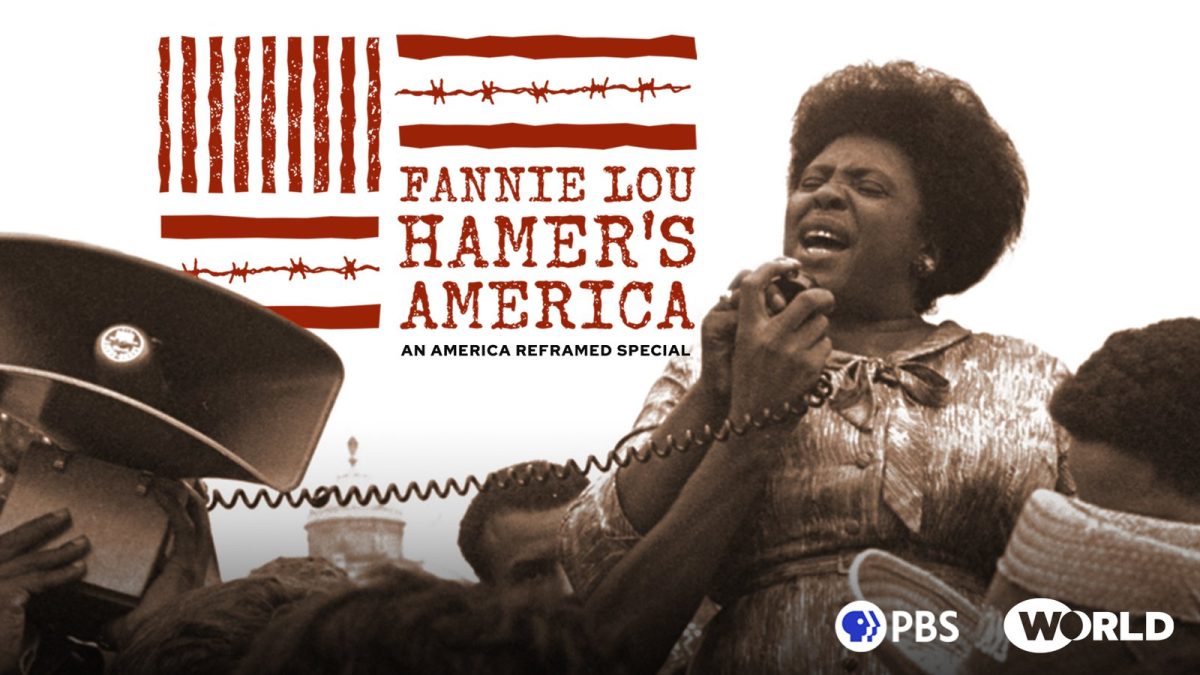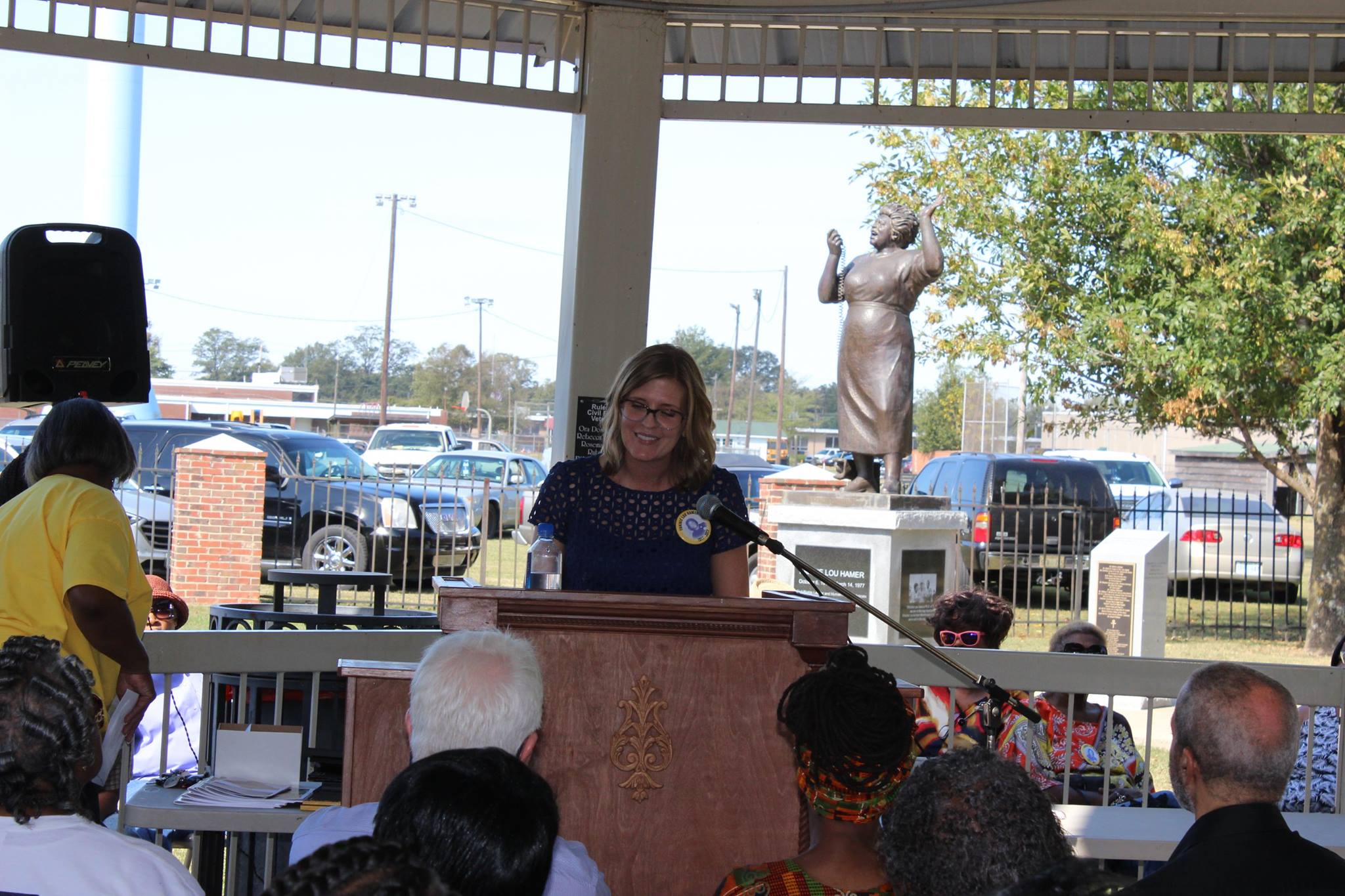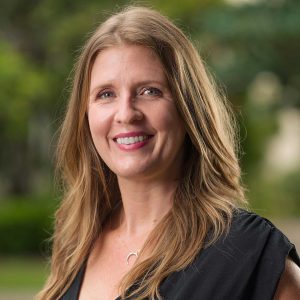
This past fall, the International Documentary Association awarded the documentary Fannie Lou Hamer’s America, which debuted on PBS and the WORLD in February 2022, with the Best TV Documentary Award. The documentary tells the story of the groundbreaking civil rights leader Fannie Lou Hamer, who fought for desegregation, Black political representation, and voter enfranchisement. This award-winning film is noteworthy for the fact that it is told in Fannie Lou Hamer’s voice, using her speeches and other recordings – and it is additionally noteworthy because those data were gathered as a part of Communication Arts Alumna Dr. Maegan Parker Brook’s dissertation research on Fannie Lou Hamer!
We got in touch with Dr. Brooks to learn more about her research, the documentary, and her time as a student at UW-Madison.
Tell us about your research focus, and what inspired you to start researching and writing about Fannie Lou Hamer’s rhetoric and oratory?
During graduate school, I focused on public address and became familiar with Fannie Lou Hamer’s oratory during a “Gender and the Civil Rights Movement” course taught by Prof. Christina Greene in the African American Studies Department. I was surprised to learn that little had been written about Hamer in the field of Communication and that few of the many speeches I saw historians reference had ever been published, let alone studied by public address scholars. I was also surprised to learn that Hamer frequently visited Madison, spoke in the Humanities Building and the Great Hall on our campus, and was interviewed by students writing for the Daily Cardinal. I began interviewing Madison-area activists with whom Hamer organized and through my interviews I found a treasure-trove of recorded speeches Hamer delivered across Madison – many that had never been heard outside of her immediate audience. I then expanded my research across the country, interviewing people who had heard Hamer speak first-hand and researching archival and personal collections. This research formed the basis of my dissertation, which was a rhetorical biography of Hamer; the research also informed several subsequent books I would go on to publish, including the co-edited (with Davis W. Houck) collection of Hamer’s speeches.

How did you come to be involved with the documentary? How did your research help shape the documentary?
Connecting with Fannie Lou Hamer’s family and sharing resources with her Mississippi Delta community was a vital part of my research. Early on, organizers in Hamer’s community invited me to serve on the Fannie Lou Hamer Statue Fund Committee, which brought a full-size bronze statue of Hamer to her gravesite in Ruleville, Mississippi. Through my fundraising and social media organizing service to this committee, I became acquainted with Hamer’s daughter and her niece. Hamer’s niece, Ms. Monica Land, shared her vision of creating a documentary about her aunt. I shared with her the speeches and other primary source materials I had been gathering for my dissertation. In partnership with Davis W. Houck (Florida State University) and filmmaker Joy Davenport, we realized that we had found enough recorded material to create a film wherein Hamer could tell her own story. The journey to raise enough funds to produce the film, let alone to get it on PBS, was long and difficult. But all along the way, our project was enriched as our team worked with youth in the Mississippi Delta through filmmaking workshops, with K-12 teachers to create Hamer-inspired lesson plans for their classrooms, and with local artists and organizers.
Tell us about bridging the gap between academic scholarship and public scholarship, like the documentary. What are the similarities and differences? And how do you navigate these different ways of looking at and sharing about research?
I consider myself a public humanities scholar. I always approach research projects with the goal of public dissemination in mind, so while I integrate interdisciplinary scholarship into my work and while I do write peer-reviewed journal articles/publish with academic presses, I also am passionate about sharing what I learn as broadly as possible. I’ve done this through such forms as a BrainPOP cartoon animation, a children’s book, the lesson plans I helped design with K-12 teachers in the Delta, and the documentary. All of these materials are freely available (see www.fannielouhamersamerica.com), written/designed in an accessible manner, and oriented toward reaching an array of audiences. I am currently working on a project about grief that takes a similar approach. My grief project, like the Hamer project, is informed by interdisciplinary scholarly research and community-based engagement (I facilitate grief support groups in my community), and I am seeking to share what I’m learning with as many audiences as possible through a book and workbook I am creating for general audiences. If readers are interested in learning more about how to do public humanities research, I am co-leading (with Brandon Inabinet) a “Rhetorics for All” workshop at the Rhetoric Society of America’s Summer Institute.
How did your time as a PhD student in the Communication Arts department shape you as a scholar?
I’m incredibly grateful for my time at UW in Comm Arts. I felt supported in the public humanities work I knew I wanted to go on to do. I benefited from a variety of teaching experiences that have helped me reach ever-broader audiences. And, of course, the serendipity of learning about Fannie Lou Hamer’s deep connections to Madison while also living there helped shape my research in profound ways.
You can learn more about Dr. Maegan Parker Brooks, her research, and the documentary here:
 Faculty Bio: Maegan Parker Brooks, Associate Professor, Civic Communication and Media, Willamette University
Faculty Bio: Maegan Parker Brooks, Associate Professor, Civic Communication and Media, Willamette University
For more information about the documentary and free access to the Children’s Book, BrainPop Cartoon Animation, K-12 Curriculum, check out: https://www.fannielouhamersamerica.com/
Books:
Brooks, Maegan P. Fannie Lou Hamer: America’s Freedom Fighting Woman. Library of African American Biography Series. Lanham: Rowman & Littlefield (March 2020).
* A Booklist Starred Review
Brooks, Maegan P. A Voice that Could Stir an Army: Fannie Lou Hamer and the Rhetoric of the Black Freedom Movement. Jackson: University Press of Mississippi, 2014.
*Named an “Outstanding Academic Title of 2015 by the American Library Association
Brooks, Maegan P. and Davis W. Houck, Eds. The Speeches of Fannie Lou Hamer: To Tell It Like It Is. Jackson: University Press of Mississippi, 2011.